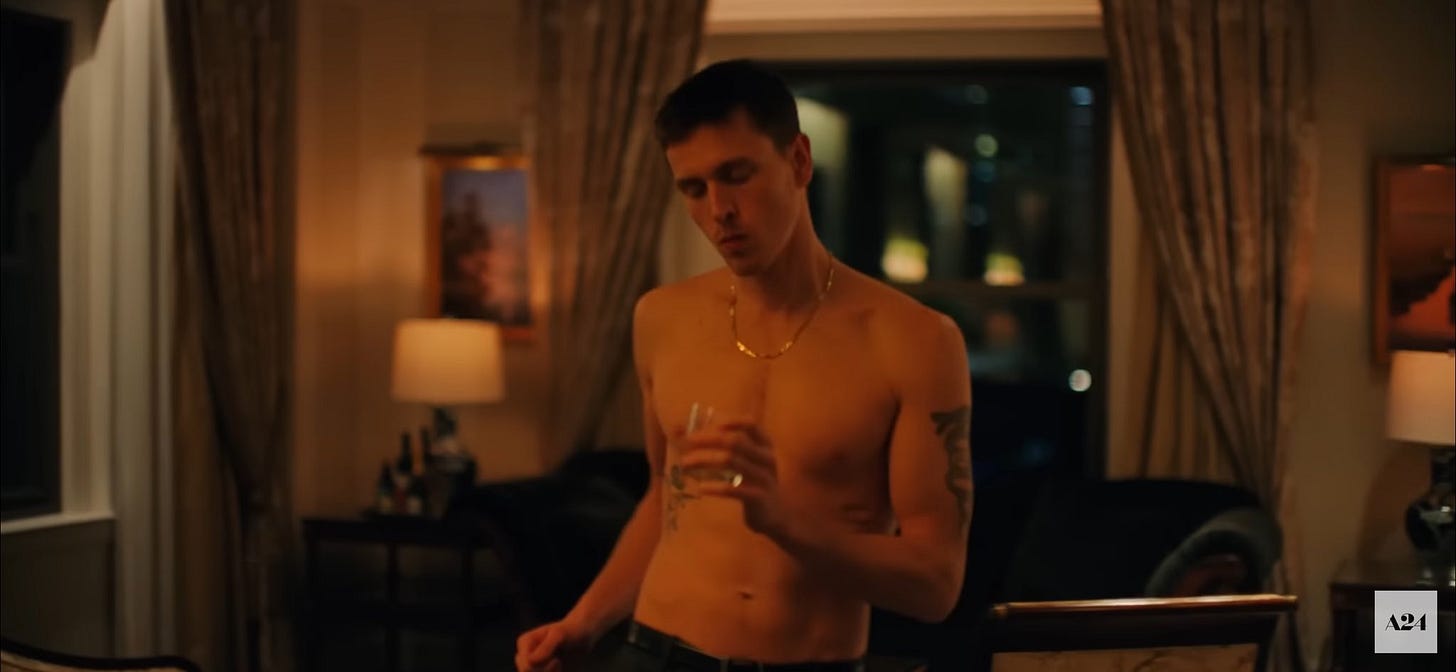When I left the theater, I wasn’t sure I thought much of this film, it left me a bit cold. However, sitting down to write this review and reflecting more deeply on its themes has made me appreciate just how subversive it truly is. Mild spoilers ahead!
Babygirl (2024), written and directed by Halina Reijn (Bodies Bodies Bodies, 2022), is an erotic thriller that explores power dynamics. The film follows Romy (Nicole Kidman), a 50-something high-powered CEO, wife, and mother of two teens. She’s married to Jacob (Antonio Banderas), a theater director. From the outset, the film centers on Romy’s sensuality. The opening scene shows her face in focus as she makes love to her husband and tries to reach climax. She feigns an orgasm, and in the next scene, we see her sneaking away to watch BDSM porn and masturbate—seeking satisfaction she doesn’t get from her marital sex life.
This sequence sets the stage for the fissures in Romy’s marriage. Her desires and fantasies remain unmet, and, after decades, she has not openly communicated them to her husband. In all other aspects of her life, she exudes upmost confidence. Romy is a woman who has climbed the career ladder deftly and serves as a feminist role model to her young executive assistant. She maintains a set self-care routine, which includes Botox and therapy, and she dutifully prepares her daughters’ lunches each morning.
Her carefully constructed life gets upended by Samuel (Harris Dickinson), a new intern at her company, which specializes in automated technology. Their first encounter occurs on the street when an out-of-control dog threatens passersby. Samuel quickly gets the dog under control, tenderly pets him, and then returns him to his owner. There’s something about seeing Samuel tame the animal that stirs something in Romy.
The initial exploration of the power dynamics between them is mild. He signs up to become her mentee, which she is rather annoyed by and tries to avoid. Later on, at a company party, he orders her a glass of milk, which she gamely drinks in front of her colleagues as he watches on.
Their office flirtation quickly escalates when he invites her to a seedy hotel. She shows up but is wary, nervous, and wants to back out. After a bit of protestation, they start to engage in a form of mild pet play wherein she gets on her hands and knees, crawls toward him, and eats a candy out of his hand. In a later encounter, she slurps milk out of a saucer while on her hands and knees. Both characters fumble through their exploration of kink, only discussing rules, consent, and safe words weeks into their affair.
This isn’t Harris Dickinson’s first rodeo in terms of playing a younger man in a relationship with an older woman with a tricky power dynamic at play, wherein she’s very much the alpha. His chemistry with Dolly De Leon in Triangle of Sadness (2022) is one of the highlights of that film’s three-part act. However, Babygirl gives Dickinson fewer opportunities to exude sensuality, with only a few standout scenes where he truly captivates.
One such moment is the Father Figure dance scene, where the camera lingers on Samuel’s body, presenting him as Romy sees him: a carefree young man brimming with sex appeal. There’s a certain cavalierness about him that is pretty hot. Later, in a scene at a bumping rave, his dominant, protective masculinity is depicted—he’s on the dance floor, very much high, but the way he proceeds to lead her through the crowd into a secluded area to share a smoke is super hot. Click the image below to watch the scene.
Outside of these moments, I found their sexual encounters felt overly choreographed. Kidman’s commanding presence as a cold, high-powered executive makes it difficult to believe she ever relinquishes control, even in the context of their affair. Samuel might be giving the orders, but she’s fulfilling her desires in a safe space that allows her to explore her primal fantasies—which might be the point. He could end her career at any moment, but she keeps pursuing this thrill.
There’s an unexplored thread in the movie about Romy being raised in a cult, but the script never develops what this means, if anything, for her desire to submit in order to get off. There’s also a thread about corporate feminism and women supporting women that feels a bit tacked on and doesn’t really add much to the central plot of this woman leaning into her lust—but perhaps it speaks to her selfishness, her ability to lie, and to manipulate.
Romy and Samuel’s affair eventually blows up, leading to a confrontation with a woefully underutilized Antonio Banderas, who is truly the only one in the film delivering any kind of real passion. There’s a particular moment of tenderness between Jacob and Samuel that was honestly one of the more sensual moments in the film. Jacob is meant to represent old-guard, repressed sexuality, but Banderas, with his undeniable charisma and sensuality, feels miscast. It’s hard to believe Romy has been unfulfilled for 19 years with him as her partner.
Kidman’s performance has been called raw and fearless. But why? Because she’s daring to play a woman over 50 enjoying unconventional sex? I think explorations of the sexuality of older women are vital, as they’re rarely depicted in pop culture. Society often acts as if women lose their sexual relevance after menopause, despite many continuing to have satisfying sex lives well into their later years.
Miranda July’s critically acclaimed novel All Fours (2024) does an excellent job of exploring its narrator’s fears of being on the precipice of menopause and what that means for the dampening of her future sex life. The impending doom of it all drives her to take all kinds of risky decisions in pursuit of a younger married man, even though she is married herself. It’s well worth the read for its exploration of the interiority of women’s sexual fantasies.
In cinema, women’s sexual agency is often portrayed as a threat to male dominance. The 1990s featured a slew of films addressing this theme, such as Basic Instinct and Disclosure. For a deep dive into this era, I recommend Karina Longworth’s Erotic 90s podcast series—it’s a fascinating exploration of sex in Hollywood movies.
Hollywood remains far more comfortable depicting teenage girls’ sexual awakenings or women suffering sexual abuse than celebrating the sexuality of older women. Babygirl provides a rare glimpse of female desire beyond youth and conventional sex, so in this regard, it is a valuable addition to the canon, despite its flaws.
Director Halina Reijn’s Take
I’m always fascinated by the interplay between an artist’s intent and the audience’s reception and perception of their work. While there’s been plenty of age-gap discourse surrounding this film, I find that to be the least compelling angle—it’s a rather conventional lens through which to view the story. Watch below as the director explains Romy’s journey of self-destruction and rebirth, her quest to reveal her true self amidst societal pressures, and the exploration of kink and consent.
Babygirl concludes with a glimpse into Romy’s mind and the fantasy she experiences as she embraces her freedom to achieve orgasm. When I first watched it in the theater, I found the scene somewhat confusing. However, after hearing the director discuss the intent behind it—highlighting women feeling empowered to ask for what they want in the bedroom without shame—I gained a deeper appreciation for the significance of the entire film.




